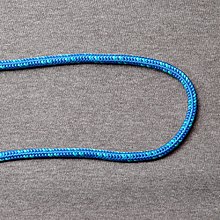bight
Jump to navigation
Jump to search
English[edit]
Etymology[edit]
From Middle English bight, biȝt, byȝt (also bought, bowght, bouȝt; see bought), from Old English byht (“bend, angle, corner; bay, bight”), from Proto-West Germanic *buhti, from Proto-Germanic *buhtiz (“bend, curve”), from Proto-Indo-European *bʰūgʰ- (“to bend”).
Cognate with Scots bicht (“bight”), Dutch bocht (“bend, curve”), Low German Bucht (“bend, bay”), German Bucht (“bay, bight”), Danish bugt (“bay”), Icelandic bugða (“curve”), Albanian butë (“soft, flabby”).
Pronunciation[edit]
Noun[edit]
bight (plural bights)


- A corner, bend, or angle; a hollow
- the bight of a horse's knee
- the bight of an elbow
- 1905, Robert Louis Stevenson, Travels with a Donkey in the Cévennes, page 166:
- I spied a bight of meadow some way below the roadway in an angle of the river.
- An area of sea lying between two promontories, larger than a bay, wider than a gulf
- (geography) A bend or curve in a coastline, river, or other geographical feature.
- A curve in a rope
- 1899 February, Joseph Conrad, “The Heart of Darkness”, in Blackwood’s Edinburgh Magazine, volume CLXV, number M, New York, N.Y.: The Leonard Scott Publishing Company, […], →OCLC, part I:
- I could see every rib, the joints of their limbs were like knots in a rope; each had an iron collar on his neck, and all were connected together with a chain whose bights swung between them, rhythmically clinking.
Related terms[edit]
Translations[edit]
bend
|
large bay
|
curve
Verb[edit]
bight (third-person singular simple present bights, present participle bighting, simple past and past participle bighted)
- (transitive) To arrange or fasten (a rope) in bights.
See also[edit]
Categories:
- English terms derived from Proto-Indo-European
- English terms derived from the Proto-Indo-European root *bʰewgʰ-
- English terms inherited from Middle English
- English terms derived from Middle English
- English terms inherited from Old English
- English terms derived from Old English
- English terms inherited from Proto-West Germanic
- English terms derived from Proto-West Germanic
- English terms inherited from Proto-Germanic
- English terms derived from Proto-Germanic
- English 1-syllable words
- English terms with IPA pronunciation
- English terms with audio links
- Rhymes:English/aɪt
- Rhymes:English/aɪt/1 syllable
- English terms with homophones
- English lemmas
- English nouns
- English countable nouns
- English terms with quotations
- en:Geography
- English verbs
- English transitive verbs
- en:Bodies of water